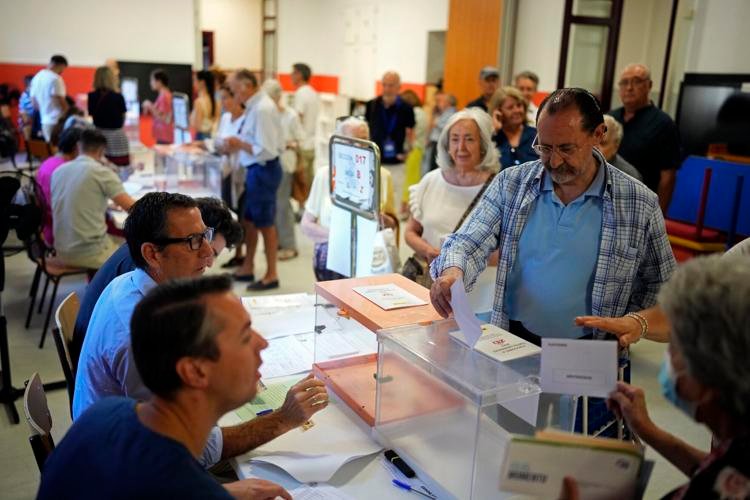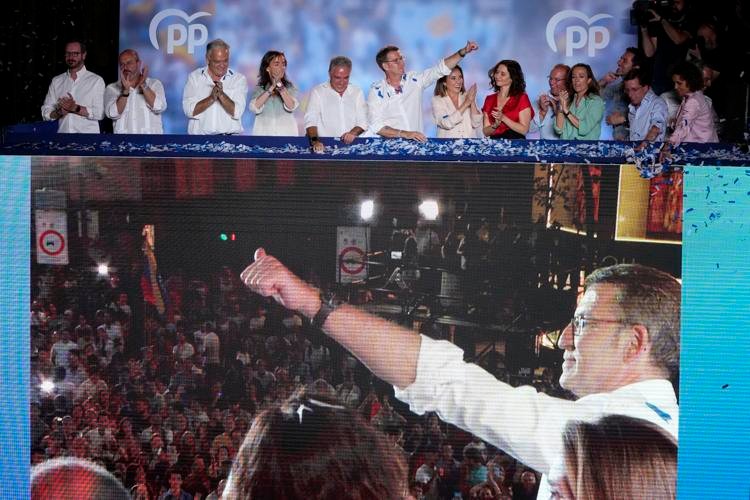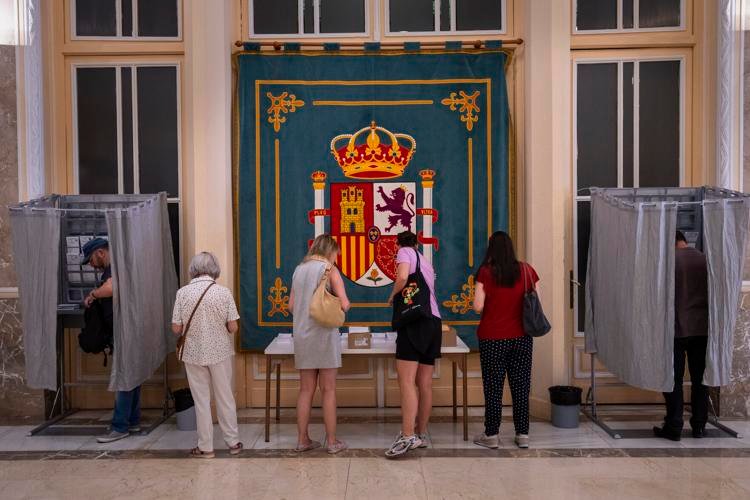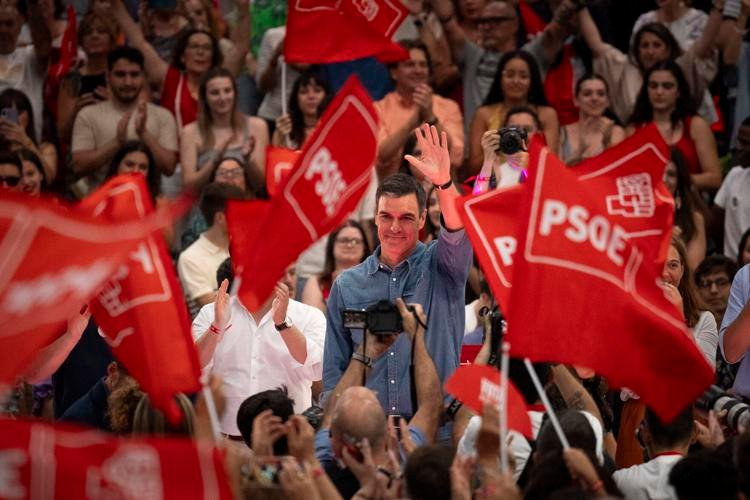Sunday’s general election in Spain yielded no evident victory, resulting in political gridlock and uncertainty
After four years of left-wing rule, Spain held a highly unusual election on Sunday in which Spaniards were offered with two starkly contrasting visions at the general election polls. Alberto Nez Feijóo, leader of the conservative opposition party in Spain, has declared victory in Spain’s snap election despite not achieving the desired outcome.
Socialist Prime Minister Pedro Sánchez had called the snap election as a response to a disappointing outcome at the May local elections in which his Socialist party came second to its main rival, the conservative Popular Party. The nation of 48 million people has never held general elections so late in the summer, with temperatures exceeding 40 degrees Celsius. Although it has been criticized because the election was held at a time when so many Spaniards are on vacation, 2.6 million people opted to vote by post. The total voter turnout was over 70% in the election.
Conservatives miss out on all-out victory
With 33.1% of the vote, the opposition right-wing Popular Party (PP) emerged victorious in Spain’s snap election. However, they fell short of a majority, securing 136 of the 350 seats in the lower chamber. The Socialist Party of Spain (PSOE) won 31.7% of the vote and 122 seats. With neither party attaining the 176 seats required for a majority, the country confronts political uncertainty.
Both Socialist Prime Minister Pedro Sánchez and Conservative Leader Alberto Nez Feijóo declared victory in Spain’s snap elections. While Sánchez declared that the “reactionary bloc” had failed, Feijóo expressed his “duty to try to form a government”, emphasizing that his party had become the one with the most votes.
However, neither party won an absolute majority in the legislative body. With Vox securing 33 seats and PP securing 136, they lack an absolute majority by seven seats, making another election likely by the end of the year. The path to establishing a stable government appears difficult for both parties, and Spain will likely experience a period of unpredictability as political negotiations progress.

Parties now look to form coalitions amid political gridlock
As the party with the most seats, the PP will have the first chance to form a government, but its alliance with Vox may impede its ability to garner support from other factions. The Socialists, on the other hand, have more options, but they could face challenging demands from Catalan separatist parties, including the possibility of an independence referendum, which could lead to political chaos similar to that which occurred in 2017 during Catalonia’s previous attempt to break away from Spain.
To establish a minority government, Sánchez may need the support of the left-wing separatist party Esquerra Republicana de Catalunya (ERC), as he did in 2019. However, he will likely also need the support of the more conservative Junts party, which has not supported him in the past four years, making the formation of a stable government uncertain.
The minor party Vox is poised to become a kingmaker in Spain following the election results. Pre-election polls had predicted a larger majority for the People’s Party (PP), but it must now negotiate with minor parties in order to reach the 176-seat threshold needed to form a government. Despite forming coalitions with Vox in multiple regions and cities since the last local elections, PP leader Nunez Feijoo has previously stated that a Vox-led government would not be optimal.
In addition, Vox’s proportion of seats in the most recent election decreased from 52 to 33. Vox, which campaigned on a platform of turning back laws on gender violence, LGBTQ rights, abortion, and euthanasia, lost 19 seats compared to four years ago.
A battle of policies and personalities
Election in Spain was held amidst a positive economic backdrop, with the country experiencing rapid economic growth, and inflation dipping to 1.9% from a peak of 11% a year ago
The snap election in Spain was held amidst a positive economic backdrop, with the country experiencing rapid economic growth, and inflation dipping to 1.9% from a peak of 11% a year ago, significantly lower than the 6.1% Eurozone average. The unemployment rate decreased substantially from 26% a decade ago to approximately 13%.

The majority of the population supported the policies of the Sánchez administration, and the economic orientation of the country was well received. However, the election had turned into more of a personality contest between Pedro Sánchez and Alberto Núñez Feijóo. Sánchez was criticized for his concessions to Spain’s separatist parties, which included pardoning nine Catalan leaders involved in the region’s failed secessionist bid in 2017 and reforming the sedition laws under which they were charged. This support had been “toxic for Sánchez,” leading to concerns that some of the Socialists’ more moderate supporters would abstain from voting or vote for the PP because they believed the party had moved too far to the left.
In the meantime, Feijóo’s critics argued that he represented Vox’s best route to power, which could result in opposition to the E.U., immigration, LGBTQ, and women’s rights. While Feijóo preferred to govern without Vox, he had not explicitly ruled out the possibility.
The focus of Feijóo’s election campaign was to attack the unreliability of Prime Minister Pedro Sánchez. The opposition parties presented obstacles for Sánchez’s election campaign, particularly the criticism from PP and Vox regarding laws on transgender rights, abortion, and sexual consent.
The election results indicate a potential political gridlock and weeks of uncertainty regarding the formation of a new government.
Is Spain’s hung parliament becoming a tradition?
After a new parliament convenes on August 17, negotiations to establish governments will begin. King Felipe VI then will appoint one of the party leaders to form a new administration by submitting themselves to a parliamentary vote. There is a maximum of three months for legislators to strike an agreement. Otherwise, fresh elections would be called to break the political impasse.
Due to the fragmentation of Spanish politics and the emergence of new parties challenging the dominance of the PP and the PSOE, hung parliaments have become the norm in recent years. In late 2015 and early 2016, the country held two elections within six months, after which there was a 10-month standoff until the Socialists consented to abstain from a vote of confidence to allow the PP to form a minority government. Before the PSOE and the far-left Podemos agreed to establish Spain’s first coalition government in 2019, two additional elections were held in 2019.

In conclusion, the snap election in Spain has left the country facing political gridlock and uncertainty as neither PP nor Socialist secured an absolute majority in parliament. Consequently, both parties will need to negotiate and form coalitions with smaller parties after the new parliament convenes, and the country will closely watch how the political landscape evolves in the coming months.


